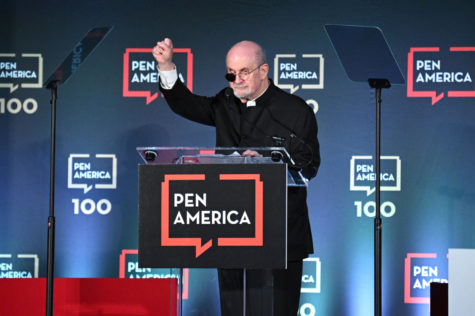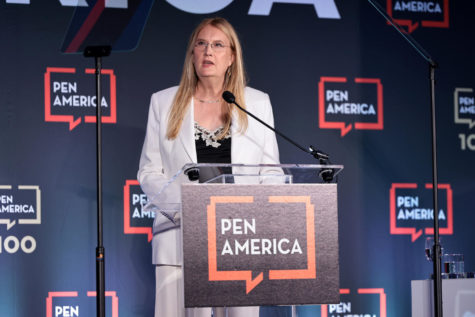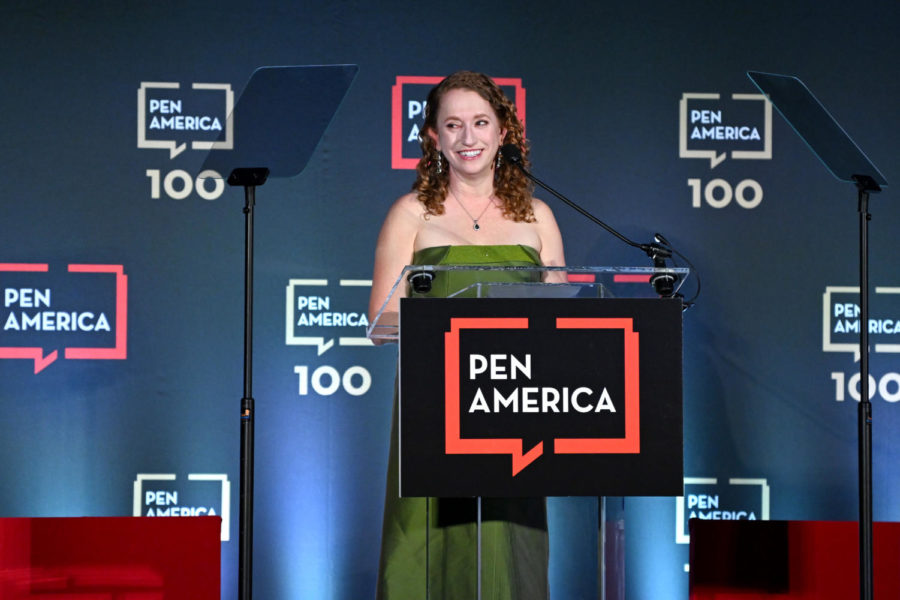Putting PEN to Paper: A Conversation with PEN America CEO Suzanne Nossel
How an organization’s unwavering commitment is shaping the defense of free expression.
“We defend free speech not because we want the right to scream at the top of our lungs. We defend free speech because our society and democracy depend upon our ability to reason with others, persuade, and be persuaded… The battle we’re waging is a fight for the lifeblood of writers, our kids’ education, our birthright as citizens, and the soul of our democracy,” said CEO Suzanne Nossel. (Photo Credit: Bryan Bedder/Getty Images for PEN America. Used by permission of PEN America.)
Putting pen to paper may be viewed as a simple act, yet, contrary to popular belief, it can require the utmost courage. In many places, both in the United States and around the world, the right to one’s freedom of speech remains under constant threat. Nonprofit organizations like PEN America have been built with one goal: to protect this necessary freedom.
Originally founded on April 19th, 1922 in New York City, PEN America advocates for the freedom to write, convey information, and express ideas. The organization’s name, PEN, is an acronym for Poets, Essayists, and Novelists. Using its power, the organization provides a variety of programs and initiatives to advance its mission.
The Press Freedom Incentive Fund offered by PEN America supports members around the world to mobilize their communities around press freedom, creating new constituencies to promote and protect a free press and information access as foundations for civic engagement and a healthy democracy.
In addition to its advocacy work, PEN America organizes public events, such as panel discussions, readings, and conferences to foster dialogue and engage the public in conversations about the freedom of expression. The organization publishes reports and conducts research on various issues related to human rights, including the state of press freedom, digital censorship, and threats to artistic freedom. The organization has over 7,500 members and has had many notable members since its founding, including Maya Angelou, Langston Hughes, and Toni Morrison.

However, one member has stood out in the past year: former president of the organization, Salman Rushdie. The Indian-born British-American is best known for his controversial 1988 novel, The Satanic Verses. The novel was banned in many countries, most notably by the theocratic government of Iran. The novel was seen as blasphemous by most Muslims, as Rushdie used Islam in a satirical way.
Rushdie has been constantly threatened since 1989, a year after the publication of the novel. Iranian Supreme Leader Ayatollah Ruhollah Khomeini called for his assassination, setting a bounty of $3 million for his death. For years, Rushdie has lived in hiding and taken strict security measures. On August 12th, 2022 at the Chautauqua Institution in Chautauqua, New York, Rushdie was about to start a lecture when he was brutally attacked by a man who rushed onto the stage. Rushdie suffered from numerous stab wounds, but despite these extreme injuries, Rushdie claims he is “lucky” to have survived.
On May 18th, 2023, Rushdie made his first public appearance since the attack. Presented with the PEN Centenary Courage Award at the 2023 PEN Literary Gala, Rushdie was met with a standing ovation. “Terrorism must not terrorize us,” he said. “Violence must not deter us. La lutte continue. La lutta continua. The struggle goes on.”

Current CEO, Suzanne Nossel is another individual who embodies the mission of PEN America. In 2009, Nossel served as the Deputy Assistant Secretary of State for the Bureau of International Organization Affairs. The activist was deeply involved in U.S. engagement at the U.N. Human Rights Council. As the author of Dare to Speak: Defending Free Speech for All, Nossel uses her writing to promote free expression and the necessary advocacy for human rights.
Nossel graciously agreed to be interviewed by me over Zoom. Below are excerpts from our conversation:
How did you find your way into this cause and organization?
“My background was a combination of work in human rights organizations, work in government on foreign policy and international relations issues, and work in private sector media companies. It all pulled together in terms of PEN’s mission as an organization to defend freedom of expression worldwide. I’ve been able to draw on each piece of my background. Before I officially came to work at PEN, the more I heard, the more I started to think that the mission to defend freedom of expression is really a broad and important one. I spoke to writers who said this organization really mattered a great deal to them and that they wanted to get more involved. I ultimately determined that, with those elements in mind, it would be a really interesting role for me.”
What power and leverage do you believe PEN America has to bring about change?
“We have our voice. We have the members who stand behind us. We are a big tent organization of thousands of members who are writers from all over the United States, people from different backgrounds and genres, many of whom have large audiences. They definitely carry a great deal of cultural clout and influence. We have a sophisticated communications operation where we’re out there earning media every day. We’re engaged on social media to get our message across. We see from that, that when we raise our voice, it can really make a difference sometimes in very short order.”
Where within the United States do you see the biggest challenges that need to be addressed?
“Florida definitely is a focus area for us because they have two pieces of legislation and laws that have precipitated new forms of censorship. One is focused on LGBTQ discussions in education. Book bans are being used to limit the degree to which LGBTQ issues and identities can be discussed within the classroom. The other piece of legislation deals with issues of race, limiting those conversations, and prohibiting anything that may make anyone feel guilty on account of their race or stoke some kind of racial division. The result of that has cast a chilling effect on what’s happening in classrooms, both in K-through-12 education and in higher education. It led to the removal of books from classroom and school library shelves for fear of running afoul of these laws. They have cultivated a real atmosphere of intimidation where people feel afraid to speak out and to read what they want. For us, it’s a real concern that this becomes a new normal. We’re seeing legislatures intervening in teaching and learning on an ideological basis to exclude certain ideas in violation of the First Amendment.”
Within the past century, ideas of free speech have been changing dramatically. On the general spectrum of these freedoms being available or at risk, where do you think we currently stand? Do you believe these freedoms are more available than in the past or are we at a greater risk of losing them?
“Over the course of the 20th century, the Supreme Court broadened protections for freedom of expression considerably and constricted the power of the government to intervene and declare certain kinds of ideas, like seditious sentiment or anti-war sentiments, off limits. The Supreme Court overruled state laws that encroached on that form of expression, so it became a much more open environment for freedom of expression. However, we’re now seeing a shift in the other direction. We have this spate of state laws that are leading to book bannings and that imposed direct restrictions on what can be taught and studied in higher education. I think we’ve made progress, but right now we’re in a moment of really unfortunate and striking retreat from the protection of our First Amendment freedoms.”
How do you think free speech on university campuses has changed in recent times? How does PEN America aim to solve this specific problem?
“About six or seven years ago, we first got involved in what was happening on college campuses out of a concern about censoriousness emanating from the left side of the political spectrum. For instance, trigger warnings, calls for safe spaces, disinvitations of controversial speakers, and in some instances outbreaks of violence in places like Berkeley and Middlebury in response to speech. We became alarmed at what felt to be a rising generation that had become unmoored or alienated from the principle of free speech. Students are protesting free speech and asking the university authorities to silence speech. We started documenting that and developing a way of thinking about what we saw to be the fundamental tension between the drive to make the campus more inclusive, equal, and diverse, and the robust protections for free speech and academic freedom. From our perspective, it was always clear that campuses have a long way to go in becoming truly open and inclusive environments for students from all backgrounds, and that that was imperative work in order to provide equal education. However, those efforts need not and must not come at the expense of free speech and academic freedom. They could actually be reconciled and that the quest for greater protection for civil rights and egalitarianism depends upon free speech for their ability to be heard and to force progress. That’s the argument that we’ve been compounding, which is that equality and free speech go hand-in-hand as opposed to being opposed to one another.”
What are the biggest challenges that PEN America, as an organization, is facing in advancing its agenda?
“There’s a very concerted, well-organized opposition that casts itself in the book-banning area as being in favor of parents’ rights. There are organizations like Moms for Liberty that want to limit free speech and are very well-resourced. There is a lot of cohesion on the other side, whereas on our side of the ledger, there are groups that come at it from different orientations and missions, like LGBTQ groups, racial justice groups, and free expression groups. For us to coordinate and get on the same page is somewhat more challenging.”
What can the readers of The Science Survey/Bronx Science students do to get more involved in advocating for these freedoms?
“We do free speech institutes for high school students which is a great way to become informed and engaged. Students can learn why we defend free speech, how we defend free speech, what’s at stake, and how they can become an advocate and an activist. Students who participate in those programs have gone on to start their own organizations advocating in international and national forums, rallies, and conferences. They can get energized and excited about being part of this movement. I would encourage students at Bronx Science to plug into our work, join our Listserv, take part in our programs, come to our events, and develop a genuine care for free speech. Students can start by considering when they’re on campus in the years to come, how they can stand up for ideological diversity and for freedom of speech on behalf of those who dare to express controversial ideas.”
People like Suzanne Nossel and Salman Rushdie continue to make significant contributions in the fight for these fundamental rights. Audre Lorde, an American human rights activist, and author, famously said, “Your silence will not protect you.” PEN America refuses to stay silent, and in doing so, is protecting civil liberties when they are needed most.
“We defend free speech not because we want the right to scream at the top of our lungs. We defend free speech because our society and democracy depend upon our ability to reason with others, persuade, and be persuaded,” said Suzanne Nossel, CEO of PEN America. “The battle we’re waging is a fight for the lifeblood of writers, our kids’ education, our birthright as citizens, and the soul of our democracy.”
Nora Torok is an Editor-in-Chief for ‘The Science Survey.' At the young age of eight, Nora developed a passion for journalism. It was not long until...

